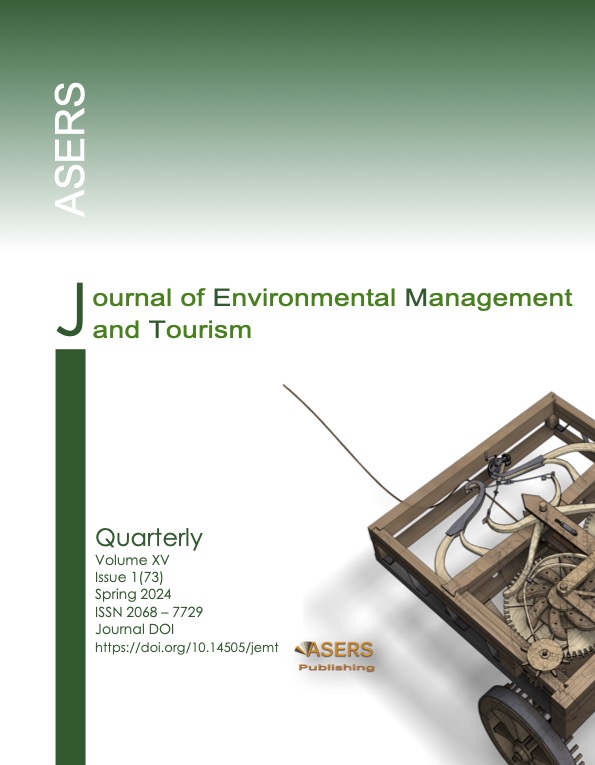The Role of Ecopreneurship in Bali’s Sustainable Tourism Development: Insights into Government Policy, Tourist Awareness and Preferences
Abstract
There are numerous environmental issues in Bali, a popular tourist destination in Indonesia, including the problems of waste, critical land, beach abrasion, coral reef destruction and water contamination, all attributed to the rapid expansion of the tourism industry. Ecotourism is one of the solutions to address these concerns, and the initiatives taken involve ecopreneurship, the process of starting and running green firms that support sustainable tourism growth in Bali. The goal of ecopreneurship in the tourism industry is to create and run enterprises that have as minimum negative environmental impacts as possible, while maximising positive social and economic consequences. This is done through improvements on both public policies and tourist preferences, to promote a sustainable tourism development. A mixed method was used, combining SEM PLS, Path Methods, and qualitative research, with comprehensive interviews conducted among ecopreneurs, government agencies, tourists, and academics in Bali. Ecopreneurship variables, comprising environmentally friendly products and services, green technology innovation, environmental and natural resource management, local community involvement, environmental education and awareness, waste and emission management, collaboration and partnerships, measurement of environmental performance and sustainability, moderated by the government policy and tourist awareness and preference, were found to have a significant influence on sustainable tourism variables, namely, natural environment preservation, social welfare and culture, local economic empowerment, resource management and environmental impact reduction, local community participation and public consultation.
References
[2] Anwar, Ch. Mahmood. 2010. Green Telecom Technology (GTT): Think Green – A step to achieve improved techno-environmental and socio-economic effects in Pakistan. Science, Technology and Development, 29(4).
[3] Baxter. 2004. Taking First Steps in Environmental Management. ISO - Management Systems, July-August.
[4] Chapple, Kroll, and Montero. 2010. Green, Local, and Growing. Center for Community Innovation (CCI), University of California. DOI: 10.13140/RG.2.2.15323.31521
[5] Chong, D K. 2020 The side effects of mass tourism: the voices of Bali islanders. Asia Pacific Journal of Tourism Research, 25(2):157-169. DOI: 10.1080/10941665.2019.1683591
[6] Cuculeski, N. and Petrovska, I. 2015. Sustainable Marketing and Consumers Preferences in tourism. European Journal of Tourism Hospitality and Recreation. 7(2) 84–90. DOI: 10.1515/ejthr-2016-0010
[7] Dixon, S. E.A. and Clifford, A. 2007. Ecopreneurship - a new approach to managing the triple bottom line. Journal of Organizational Change Management, 20(3): 326-345. DOI:https://doi.org/10.1108/09534810710740164
[8] Ekawati, N., Giantari, K. and Sariyanthi. 2017. Ecopreneurship and green innovation for the success of new spa products. Journal of Business and Retail Management Research, 11 (3) 13–24. DOI:https://doi.org/10.24052/JBRMR/268
[9] Gibbs, D. 2002. Sustainability entrepreneurs, ecopreneurs, and the development of a sustainable economy Greener Management International, 55(5): 63–78. DOI: 10.9774/GLEAF.3062.2006.au.00007
[10] Huang, D. and Kao. 2009. Salient Stakeholder Voice: Family Business and Green Innovation Adoption. Journal of Management and Organization, 15(3): 309 – 326. DOI: 10.1017/S1833367200002649
[11] Hyasat, A. 2023. Awareness and Perception Toward Heritage, Life, and Tourism in Converting Tourism Area. Journal of Environmental Management and Tourism, 8(72). DOI:https://doi.org/10.14505/jemt.v14.8(72).03
[12] Ivanko and Kivirist 2008. ECOpreneuring: putting purpose and the planet before profits. New Society Publisher
[13] Kainrath, D. 2011 Ecopreneurship in Theory and Practice : A Proposed Emerging Framework for Ecopreneurship (Lap Lambert Academic Publishing)
[14] Kirkwood and Walton. 2010. What motivates ecopreneurs to start businesses? International Journal of Entrepreneurial Behaviour and Research, 16 (3): 204-228. DOI: 10.1108/13552551011042799
[15] Machiba, T. 2009. Sustainable Manufacturing and Eco-Innovation: Framework, Practices, and Measurement. OECD Synthesis Report. DOI: 10.14207/ejsd.2013.v2n1p171
[16] Marios, et al. 2011. Green entrepreneurship in Greek furniture enterprises. MIBES – Oral. DOI:10.13140/2.1.2858.3687
[17] Pastakia, A. 1998. Grassroots ecopreneurs: change agents for a sustainable society. Journal of Organizational Change Management, 11(2): 157 – 173. DOI: https://doi.org/10.1108/09534819810212142
[18] Richomme-Huet, K. and De Freyman, J. 2011. What Sustainable Entrepreneurship Looks Like: An Exploratory Study from a Student Perspective. International Conference on Small Business. DOI:10.1007/978-3-319-01396-1_7
[19] Schaltegger, S. 2002. A framework for ecopreneurship. Greener Management International, (38). DOI:10.9774/GLEAF.3062.2002.su.00006
[20] Schaper, M. 2002. The Essence of Ecopreneurship. Greener Management International, 38: 26-30. DOI:https://doi.org/10.9774/GLEAF.3062.2002.su.00004
[21] Schick, M., and Freimann. 2002. Sustainability Issues for Start-ups Entrepreneurs. Greener Management International, 38: 59 – 70. DOI: 10.9774/GLEAF.3062.2002.su.00007
[22] Sudiarta, I N., Sumadi, K. and Purnamawati. 2021. Tanah Lot Tourism Attraction Based On Tri Hita Karana. International Journal of Recent Advances in Multidisciplinary Research, 08(12): 7401-7406.
[23] Yaacob, Mohd Rafi 2010. A Preliminary Study of Green Micro-entrepreneurs in Kelantan, Malaysia. International Journal of Business and Management, 5(3): 81 – 88 . DOI: 10.5539/ijbm.v5n3p81
Copyright© 2025 The Author(s). Published by ASERS Publishing 2025. This is an open access article distributed under the terms of CC-BY 4.0 license.
